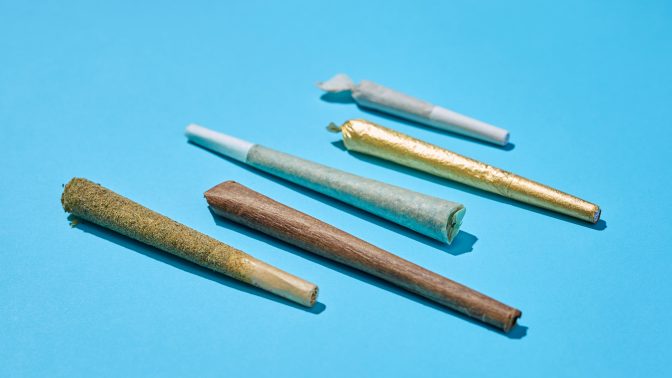Murray, Stan Jacobson's 11-year-old Labrador retriever, was having trouble going up and down the stairs. He didn't jump as high as he once did while playing fetch and walks were a bit slower than usual. Murray's arthritis was getting worse.
Jacobson asked his dog's veterinarian about treating Murray with cannabidiol (CBD), a cannabinoid that's extracted from the cannabis plant. It differs from THC in that it doesn't get users high.
“My veterinarian wasn't too helpful,” Jacobson said, “even though I broached the subject. I live in Boulder, Colorado, where both medical and recreational marijuana is legal for adults, not for dogs.” Anecdotally, some pet owners have reported that they use CBD oil for dog seizures, but legal barriers remain for medical professionals.
Veterinarians are not legally allowed to prescribe or recommend CBD products to their clients, even in states where it's legal for adult use, which makes understanding CBD oil dosage for dogs difficult, if not impossible. That's the case for Worcester, Massachusetts, veterinarian Karen Fine of the Fine Veterinary House Calls and Central Animal Hospital.
“I'm not allowed to prescribe it because of federal regulations,” she said.
While she is well aware of the anecdotal information she receives from her clients, she and other veterinarians can lose their licenses if they prescribe CBD products to their patients. CBD is categorized by the federal Drug Enforcement Administration (DEA) as a Schedule I controlled substance. So far, 47 states have legalized CBD for humans, but not for pets.
According to the National Organization for Reform of Marijuana Laws (NORML), medical doctors can prescribe CBD to their human patients; veterinarians cannot use it to treat animals.
The American Veterinary Medical Association (AMVA) notes on its website that veterinarians cannot prescribe CBD products to their clients because, “state laws legalizing use in people do not apply to cannabis use in animals.”
What's Allowed?
Where CBD is permitted as a pet remedy is tricky. California passed legislation allowing veterinarians to discuss the use of CBD products with their clients. In other states, however, veterinarians can answer questions about CBD only if the client brings it up first.
A survey from the Veterinary Information Network (VIN) found that 63% of veterinarians are asked about using CBD at least monthly and 8% are asked daily.
People Use CBD on Pets
Martha Lang's calico cat, Kitty, hates loud noises. “Thunder and fireworks are the worst,” she said. “She's so skittish during a thunderstorm and I've come to hate July 4. I heard CBD oil is good for calming pets. So, I tried it, and it works.”
Lang, who lives in Newton, New Jersey, buys CBD oil for cats online.
Anecdotally, CBD has been used for joint pain, arthritis, appetite stimulation, seizures, nausea, stress, anxiety, back pain, symptoms of cancer, and gastrointestinal issues. CBD products come in a variety of forms, too, including tinctures, capsules, and chew treats.
Being Open and Cautious
Fine, a holistic veterinarian, relies on both traditional veterinary medicine and traditional Chinese medicine in her practice, which includes using acupuncture and Chinese herbs to treat cats and dogs. Despite being open to alternative forms of medicine, she remains cautious.
“I don't like to use the word conservative,” she said, “but when it comes to treating animals, I am. That's because there's still a lot that we don't know about CBD use for pets.
“CBD is a supplement and in general most supplements are not tightly regulated,” she said. “Buying CBD is confusing, too. Often you don't know what you're getting. Some people sell CBD oils they've made in their homes. And the products online and in stores vary greatly in the amount of CBD in the products.”
Kirsten Waratuke, DVM, DABT, and Toxicologist for the American Society for the Prevention of Cruelty to Animals (ASPCA) Animal Poison Control Center, agreed.
“Cannabinoid or CBD pet treats-which are also called hemp treats—oil, and tinctures are becoming increasingly popular for both human use and pets as well. At this point, more research is needed to look at what effects CBD has in pets to better understand how it may best benefit them.”
The DEA classifies marijuana as a Schedule I controlled substance. The confusion lies with CBD and hemp. Hemp is defined as cannabis with 0.3% or less of THC. Since it has less than 0.3% of THC it was removed from the Schedule I classification after the passage of the 2018 Farm Bill.
“At the same time,” Waratuke said, “Congress preserved the FDA's current authority to regulate products containing cannabis or cannabis-derived compounds. This means that there are no FDA (Federal Drug Administration) approved cannabis or CBD products available for pets. Often, products that are available are marketed as hemp-based to skirt around the current legal status of marijuana and CBD.”
Buyer Beware
Pet owners are confused about CBD dosage for dogs and cats--is it based on body weight? Are there dosage charts? What's in the product? The later has been addressed by a 2017 study published in the Journal of the American Medical Association that examined 84 CBD-infused products produced by 31 companies. The study found only 30% of the products contained CBD that was within 10% of the amount advertised. A few of the products contained small amounts of THC, despite being labeled as THC-free.
Without knowing what we're buying, it's impossible to know how much CBD oil to give dogs or cats. Some bottles list dosages, others don't, making it impossible to say how much and how often to give. Also, a pet's size needs to be taken into account. A toy poodle wouldn't receive the same dose as a Doberman.
According to Waratuke, “More research is needed as there is no known appropriate dose for pets and we don't know the long term effects of using CBD.”
Not knowing if using the product now will have an adverse effect later gives Waratuke a lot of pause. “The main issue in CBD is quality control. A concern is that there is no consistency from batch to batch,” she said. “What may be a 'dose' in one batch may be an over-or underdose in the next.”
CBD Oil for Dog Seizures
Canine epilepsy is the top cause of recurrent seizures in dogs. Medications that treat canine epilepsy have many side effects in some breeds. Some dog owners use CBD oil for dog seizures, but does it work?
Stephanie McGrath, DVM and veterinary neurologist at Colorado State University in Fort Collins, is the lead researcher for the American Kennel Club's Canine Health Foundation's study on testing CBD to treat epilepsy in dogs. She's trying to find an answer.
“There's still so much to learn about inheritance of epilepsy, the influence of genes and epigenetics, the role of nutrition, the role of changes in the bacterial population of the intestinal tract, and other potential risk factors — we are investing in research in these areas,” McGrath said. “So, in some ways, while it is too soon to tell outcomes, you see the real need for more research.”
She's also studying adverse effects caused by CBD given to healthy dogs. McGrath explained, “Overall, the product was well tolerated clinically. However, clinically significant adverse effects, particularly diarrhea and elevations in serum ALP levels, are noteworthy and warrant further discussion and research.” ALP is alkaline phosphatase, a protein found in all body tissues.
What About Cats?
There's more data on dogs than on cats, even though there are roughly 86 million owned cats, compared with 79 million owned dogs in the U.S. Cat people tend to have two or three cats per household, while dog owners tend to have one dog. Even with those impressive numbers, little is know about the appropriate CBD oil dosage for cats.
“Research is needed,” Fine explained, “because there is so much we don't know about CBD's effect on dogs and in cats.”

Fine worries about the lack of information regarding how CBD interacts with other medications pets may be taking. “And there's less oversight and testing of pet products than for ones we humans use,” she said.
“Another issue is that the ASPCA's Animal Poison Control Center has had dogs develop the same signs as THC ingestion after ingesting CBD only-products because of the lack of regulation,” Waratuke said. “We just want to warn all pet owners to keep all marijuana/CBD products out of paws reach at all times to prevent unintended ingestions.”
Find the top CBD brands on Weedmaps with self-care products ranging from CBD oils, vapes, edibles to topicals, flower, and more.
Feature image: The legality of cannabidiol (CBD) to administer for dogs and cats trails the availability for humans. Photo by Jordan Davis on Unsplash




